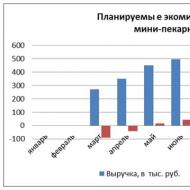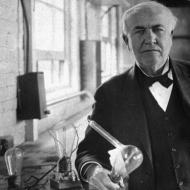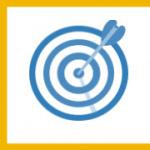
Befitting a fool. How not to be a fool: a five-step guide. You are categorical and stubborn
Benjamin Franklin once tried to catch an "electric fire" in a glass jar. serving as a primitive battery. Having succeeded in this, he thought it would be a good idea to use this charge to kill and fry his lunch. And soon he was already amazing the guests with his ability to control this strange power.
However, during one of his demonstrations, Franklin got distracted and made a stupid mistake: he touched one of the cans while holding a metal chain in his other hand.
“Those present said that the flash was very strong and the sound was like a pistol shot,” he later wrote. - A monstrous blow pierced my body from head to toe, and it was felt both outside and inside; and the first thing I noticed after it was all over was my body shaking violently.”

Obviously, a high level of intelligence does not mean that you are more rational and reasonable. Of course, now you can laugh at Franklin's eccentricities. But there are other examples that are sobering. American surgeon Atul Gawande has written extensively about tragedies in modern medicine. Despite his amazing skill, a surgeon today can kill a patient due to simple carelessness, because he forgot to wash his hands or put on a clean bandage. And in business, short-sighted thinking can lead to a number of non-standard decisions, which ultimately cause the collapse of the company.
A new way to think

The problem, according to Cornell University's Robert Sternberg, is that our current education system is not training us in the kind of thinking that is useful to us in everyday life.
“The tests we take are measures of our school skills and nothing more,” he says. - You see people who get very good grades in school, and then they turn out to be worthless leaders.
They are just excellent technical staff who have no basic ethics or common sense. Yes, they can become presidents or vice-presidents of various societies and corporations, but in a broad sense they are completely incompetent." So what should we do about it?
1. Know your blind spots
Surely you have at least once secretly thought: “I am smarter than the average person.” But this is not always true. This is what today is called "illusory superiority" and, as research shows, it is highest among the least capable people.
In your defense, you can claim that you are smart because you did well in school, or because you perform well on game shows.
If so, then you are suffering from "confirmation bias" that is, from the habit of choosing only those evidence that supports your point of view.
Still don't believe it? If this is the case, psychologists will probably tell you that you suffer from a “blind spot bias,” that is, the habit of denying the obvious flaws in your own point of view.
2. Prepare to be humble
“A man should never be ashamed to admit that he has been mistaken, for it only says that he is wiser to-day than he was yesterday,” wrote Alexander Pope, the 18th-century poet.
Today, psychologists consider such views to be a core personality trait known as “open-mindedness.” It determines how easily you deal with uncertain situations and how quickly you change your mind based on new evidence.

Some people find this trait incredibly difficult to cultivate. But these difficulties are more than worth it in the long run. For example, Philip Tetlock of the University of Pennsylvania asked ordinary people to predict the development of complex political events over the next four years. He found that the best prognosis depends not only on IQ level, but also on the ability to doubt.
"Intellectual humility" can take many forms, but at its core is always the ability to question the limits of one's own knowledge.
What assumptions are your decision based on? How verifiable are these assumptions? What additional information should you look for to make your point of view more balanced? Have you looked at examples of similar situations for comparison?

3. Argue with yourself and don’t soften the blows.
If self-deprecation is not your strong suit, then there is a simple strategy to get rid of this bias: simply choose a point of view that is directly opposite to yours, and start arguing with your beliefs.
This internal debate will help eliminate many of the most dynamic biases, such as overconfidence and anchoring - the habit of relying on only one part of the evidence, rather than the entire evidence.
A similar but slightly different tactic is to put yourself in someone else's shoes and see the situation from that person's point of view.
This can be especially helpful when solving personal problems: like the biblical King Solomon, we are often wiser by giving advice to others rather than solving our own problems.
4. Ask yourself: “What if...”
One of the biggest problems in the education system is that it does not teach us to use our minds, that is, to think practically and creatively.
One way to develop these skills is to re-imagine key events in a situation. For example, history students might try writing an essay on “What might the world have been like if Germany had won World War II” or “What would have happened if the monarchy in Great Britain had been abolished back in the 17th century”?
It may sound strange, but this approach will force you to consider a variety of possibilities and a variety of hypotheses. Young children hone this kind of “counterfactual thinking” when they play and pretend, and it helps them learn everything from the laws of physics to communication skills. Adults don't tend to practice this consciously, but once you start, you may find that dealing with the unexpected is a great way to expand your thinking.
5. Don't underestimate lists
When dealing with difficult situations, it is very easy to forget the basics. For example, Johns Hopkins Hospital has a five-item list. He constantly reminds doctors that regular hygiene procedures can reduce the incidence rate from 11% to 0%. A similar list for pilots, reminding them of basic takeoff and landing procedures, seemed to draw the line between life and death during World War II, clearly dividing subjects into the living and the dead.
As Gawande points out, all of these pilots were professionals with extensive experience and the most advanced technology. And yet, a simple piece of paper in the cockpit saved a huge number of lives.
It doesn't matter what your profession is,- It's worth considering the facts listed above before you decide you already know everything. Practice these steps and you might one day you will discover talents that you never knew about before.
The brain is a thin and delicate organ. Killing him is not easy, but very simple. By the way, according to statistics, every fourth Russian is slightly out of his mind. What should you do to be sure to destroy your gray matter?
Drank and smoked...
It’s trite, but true - nicotine and alcohol are the most effective killers that you “hire” yourself. And only drugs can compete with them.
Yes, scientists say that nicotine and alcohol can be beneficial, but no one takes them in doses “prescribed by doctors.”
By the way, if you want the harm to be maximum, wait until you are old, and then hit your nerve cells with a daily set of a couple of packs of cigarettes and a bottle of something strong. And all your relatives will be amazed by the result - personality degradation will occur at record speed.
Breathe deeply!
Poor ecology, in particular polluted air, is extremely harmful to your brain.
Nitrogen dioxide and fine dust, which are more than abundant in industrial areas, can double the oxygen supply to the brain in a very short period of time. And without oxygen, as you already know, the brain does not live long. Having taken a good breath of car exhaust, especially on a hot, dry day, you will probably feel how stupid you are.
Party all night until morning
Meticulous scientists have discovered this too. Frequent flights across several time zones, regular sleep disturbances (in particular, night work or partying) actually lead to a decrease in some lobes of the brain.
Scientists even know which parts of the brain will become smaller if you forget about night sleep. Your temporal lobe in the right hemisphere of your brain, which, by the way, is responsible for visual recognition and spatial orientation, will shrink. You can still draw your own conclusions.
Improve your computer
Who would have thought - modern information technologies in general and e-mail in particular turn out to be cooler than drugs. The computer can significantly weaken the cognitive abilities of the human brain.
Researchers have shown that heavy email users risk losing up to ten percent of their IQ, while marijuana users lose no more than five percent over the same period of time. The only consolation is that marijuana lovers who use email lose, apparently, all fifteen percent :)
Also, excessive friendship with computers and other complex equipment threatens you with such serious symptoms of personality disintegration as drowsiness, apathy and inability to concentrate. The most interesting thing is that it is especially difficult for soap lovers to distinguish between mail “gravity” and really important messages, and almost a quarter of them become infected with the obsession of constantly checking their mail.
Become a masochist
American scientists have found that pain leads to a decrease in the size of the brain. Moreover, these changes are most likely irreversible, since nerve cells die from pain.
A prolonged attack of pain can lead to the loss of 11% of brain matter (this is equal to the natural reduction of the brain over 10-20 years of life). For people suffering from constant pain, 1.3 cubic centimeters of brain tissue is lost each year of illness. The thalamus, where the nerve center of pain is located, is mainly affected. The same thalamus is responsible for decision making and social behavior. So pain can significantly disrupt your social behavior, although this is understandable without much research.
This is surprising, but people often believe that the mind cannot be developed. One of my courses is called: “How to become smarter.” And I often receive letters in which they write to me in all seriousness: “I couldn’t be smarter.”
Why is there such a strange opinion that it is impossible to grow wiser?
To answer this question, you need to understand the most common curse word: “Fool.” Where did this word come from and what does it mean?
Tired mother
I read a fairy tale to my daughter:
“The father had three sons:
the eldest was a smart kid,
middle son - this way and that,
the youngest was a complete fool..."
- Mom, was their father sick or what?
- Where did you get the idea?
- What does he have every time?
Did it get worse and worse?
The word "fool" comes from the Turkic word "fool", which means "a place of stopping, rest, hitching post in the steppe." In modern Turkish, a stop is called “durak”.
In the old days, Russian families didn’t bother much with children’s names. The children were named as they appeared: Pervak, Drugak, Tretyak, Chetvertak, Pyatak, Shestak and so on. When the mother got tired of giving birth, the latter was called the Fool, that is, “we’ll stop there.”
Therefore, the beginning of Russian fairy tales about Ivan the Fool does not mean that he is stupid, but means that he is the youngest.
In the documents of the 15th-17th centuries there are quite respectable people:
- Prince Fyodor Semenovich Fool of Kemsky,
- Prince Ivan Ivanovich the Bearded Fool Zasekin,
- Moscow clerk Fool Mishurin.
But later the word “fool” became synonymous not only with the youngest son, but also with the most undeveloped one. That is, “fool” began to be used as “fool.”
And even later, this was the name given to adults who had stopped developing. They considered themselves the smartest, stopped studying and remained fools for the rest of their lives.
A fool is a man
who believes
that he has nowhere to get smarter,
because he is already smarter than everyone else.
In fact, there are no limits to development. All my life I have been collecting thinking techniques that allow me to solve problems much faster and more efficiently. And every time I find a new technique, I’m surprised: “How did I not think of this before?” Indeed, you can solve life’s problems much easier and simpler if you know how to activate your mind.
From a review of the course “How to become smarter”:
“When I saw your course “How to become smarter,” I thought: “Am I a fool?” I bought it and started studying it. It's a shame, but my doubts were confirmed. Gradually I began to change my habits in accordance with the recommendations of the course. I am changing the organization of my work. The salary is already higher..., plus half a day of free time.”
Getting rid of stupidity
If you're smarter than everyone else,
then who will understand this?
Just when it seemed to you that you couldn’t get any smarter, you’ve already fallen into a trap. Because as soon as you consider yourself the smartest, then you will try to explain any problems by external circumstances or the machinations of others.
There is another effect of stopping development. If you already know everything, then you will explain any opinions that do not coincide with yours with the mental inferiority of those around you.
And then a “brilliant” thought comes: “If everyone around you is stupid, then why listen to them?!” And the trap slams shut. Indeed, now it is basically impossible to become smarter.
But there is another way. Say to yourself like Socrates: “I know that I know nothing.” And become open to new knowledge and new discoveries.
Then the whole world becomes interesting and full of mysteries. Every person is perceived as a teacher from whom you can always learn something new. Every day brings new knowledge and skills.
Do you want to become smarter?
stop counting yourself
the smartest.
People who consider themselves super experts and give out “valuable” advice left and right, even if they are not asked for it, are usually lacking in intelligence. If a person is sure that he has learned absolutely everything and can bring the truth to the world himself, things are bad.
He stops noticing his own mistakes, but actively notices others. As a result, he stops developing, because he is sure that he has achieved everything. And those who disagree with him are simply “close-minded and ignorant people.” And someday they will definitely regret it.
A fool never reaches a dead end, because there are plenty of smart people out there. More precisely, “too smart.”
A smart person loves to learn, and a fool loves to teach.
Anton Chekhov
2. You are constantly trying to prove that you are not a fool.
Everything seems to be fine. But from time to time an unpleasant feeling gnaws at you from within. It seems that friends and colleagues say one thing to your face, but behind your back they say something completely different. And you have no choice but to strike preemptively: actively prove to everyone that you are not a fool.
People who are unsure of their knowledge and skills are in great need of outside support, recognition and confirmation of their own merits. It is not without reason that they say that an intelligent person is happy only when he receives his own praise, while a fool is content with the applause of others.
A fool who admits that he is a fool is no longer a fool.
Fedor Dostoevsky
3. You don't know how to see the future
If they say about you “Can’t see beyond your nose,” perhaps those around you doubt your mental abilities. Limited people do not know how to think big, they do not undertake to analyze what is happening and make predictions, including those concerning their lives.
This limitation often manifests itself in a lack of interest in trends and a reluctance and even fear to look beyond the horizon. You live in a cozy hole that you don’t want to get out of. But this, alas, limits your development and opportunities.
An intelligent person sees before him an immeasurable realm of the possible, but a fool considers only what is possible to be possible.
Denis Diderot
4. You are annoyed by the intelligence of others.
A good phrase: a fool is the first to notice how many smart people there are around. If you are surrounded by extremely annoying people who are “acting like crazy,” this is a bad sign.
As a rule, they rejoice at other people’s achievements and are quite tolerant of shortcomings. And fools notice them and emphasize them, love comparisons and very often condemn them.
If vanity made someone happy, then that someone was probably a fool.
Jean-Jacques Rousseau
5. You speak first and think later.
This bad habit usually leads to big problems. Fools love to lash out and do not think about the consequences that carelessly expressed thoughts can lead to. But a thoughtlessly thrown phrase can hurt no worse than a knife.
As a rule, this is characteristic of people who do not know how to think, compare facts and draw conclusions. And those around you suffer from this. It's no wonder they have an unflattering opinion of you.
Rudeness is the wit of fools.
Andre Maurois
6. You are adamant and stubborn
There is a well-known saying: a smart person changes his mind, but a fool never. Stubbornness, obstinacy, reluctance to admit that you are wrong and to accept the facts indicating this are bad signs.
Often such people like to make categorical conclusions about significant events, foaming at the mouth to prove their point, and stigmatize those who have a different opinion. There is no use arguing with such people.
The best way to convince a fool that he is wrong is to let him have his way.
Henry Wheeler Shaw
Benjamin Franklin once tried to catch an "electric fire" in a glass jar. serving as a primitive battery. Having succeeded in this, he thought it would be a good idea to use this charge to kill and fry his lunch. And soon he was already amazing the guests with his ability to control this strange power.
However, during one of his demonstrations, Franklin got distracted and made a stupid mistake: he touched one of the cans while holding a metal chain in his other hand.
“Those present said that the flash was very strong and the sound was like a pistol shot,” he later wrote. - A monstrous blow pierced my body from head to toe, and it was felt both outside and inside; and the first thing I noticed after it was all over was my body shaking violently.”

Obviously, a high level of intelligence does not mean that you are more rational and reasonable. Of course, now you can laugh at Franklin's eccentricities. But there are other examples that are sobering. American surgeon Atul Gawande has written extensively about tragedies in modern medicine. Despite his amazing skill, a surgeon today can kill a patient due to simple carelessness, because he forgot to wash his hands or put on a clean bandage. And in business, short-sighted thinking can lead to a number of non-standard decisions, which ultimately cause the collapse of the company.
A new way to think

The problem, according to Cornell University's Robert Sternberg, is that our current education system is not training us in the kind of thinking that is useful to us in everyday life.
“The tests we take are measures of our school skills and nothing more,” he says. - You see people who get very good grades in school, and then they turn out to be worthless leaders.
They are just excellent technical staff who have no basic ethics or common sense. Yes, they can become presidents or vice-presidents of various societies and corporations, but in a broad sense they are completely incompetent." So what should we do about it?
1. Know your blind spots
Surely you have at least once secretly thought: “I am smarter than the average person.” But this is not always true. This is what today is called "illusory superiority" and, as research shows, it is highest among the least capable people.
In your defense, you can claim that you are smart because you did well in school, or because you perform well on game shows.
If so, then you are suffering from "confirmation bias" that is, from the habit of choosing only those evidence that supports your point of view.
Still don't believe it? If this is the case, psychologists will probably tell you that you suffer from a “blind spot bias,” that is, the habit of denying the obvious flaws in your own point of view.
2. Prepare to be humble
“A man should never be ashamed to admit that he has been mistaken, for it only says that he is wiser to-day than he was yesterday,” wrote Alexander Pope, the 18th-century poet.
Today, psychologists consider such views to be a core personality trait known as “open-mindedness.” It determines how easily you deal with uncertain situations and how quickly you change your mind based on new evidence.

Some people find this trait incredibly difficult to cultivate. But these difficulties are more than worth it in the long run. For example, Philip Tetlock of the University of Pennsylvania asked ordinary people to predict the development of complex political events over the next four years. He found that the best prognosis depends not only on IQ level, but also on the ability to doubt.
"Intellectual humility" can take many forms, but at its core is always the ability to question the limits of one's own knowledge.
What assumptions are your decision based on? How verifiable are these assumptions? What additional information should you look for to make your point of view more balanced? Have you looked at examples of similar situations for comparison?

3. Argue with yourself and don’t soften the blows.
If self-deprecation is not your strong suit, then there is a simple strategy to get rid of this bias: simply choose a point of view that is directly opposite to yours, and start arguing with your beliefs.
This internal debate will help eliminate many of the most dynamic biases, such as overconfidence and anchoring - the habit of relying on only one part of the evidence, rather than the entire evidence.
A similar but slightly different tactic is to put yourself in someone else's shoes and see the situation from that person's point of view.
This can be especially helpful when solving personal problems: like the biblical King Solomon, we are often wiser by giving advice to others rather than solving our own problems.
4. Ask yourself: “What if...”
One of the biggest problems in the education system is that it does not teach us to use our minds, that is, to think practically and creatively.
One way to develop these skills is to re-imagine key events in a situation. For example, history students might try writing an essay on “What might the world have been like if Germany had won World War II” or “What would have happened if the monarchy in Great Britain had been abolished back in the 17th century”?
It may sound strange, but this approach will force you to consider a variety of possibilities and a variety of hypotheses. Young children hone this kind of “counterfactual thinking” when they play and pretend, and it helps them learn everything from the laws of physics to communication skills. Adults don't tend to practice this consciously, but once you start, you may find that dealing with the unexpected is a great way to expand your thinking.
5. Don't underestimate lists
When dealing with difficult situations, it is very easy to forget the basics. For example, Johns Hopkins Hospital has a five-item list. He constantly reminds doctors that regular hygiene procedures can reduce the incidence rate from 11% to 0%. A similar list for pilots, reminding them of basic takeoff and landing procedures, seemed to draw the line between life and death during World War II, clearly dividing subjects into the living and the dead.
As Gawande points out, all of these pilots were professionals with extensive experience and the most advanced technology. And yet, a simple piece of paper in the cockpit saved a huge number of lives.
It doesn't matter what your profession is,- It's worth considering the facts listed above before you decide you already know everything. Practice these steps and you might one day you will discover talents that you never knew about before.















